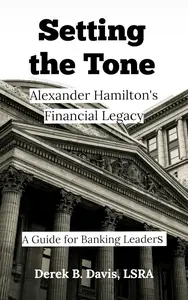
Free Download Setting the Tone: Alexander Hamilton's Financial Legacy by Derek B. Davis
English | April 27, 2024 | ISBN: N/A | ASIN: B0D2VY1X5D | 120 pages | EPUB | 10 Mb
Studying Alexander Hamilton is crucial for understanding the foundational principles of the American banking system. As the first Secretary of the Treasury, Hamilton established the First Bank of the United States, laying the groundwork for the country's national banking system and setting precedents that continue to influence financial institutions today.
Hamilton's advocacy for a central bank was driven by his vision of a robust economy supported by a stable monetary system. He recognized the necessity of a central institution capable of managing the government's finances, stabilizing the currency, and providing credit to foster economic growth and stability (Wright, 2006).
The insights into the interplay between government finance, economic policy, and banking practices were revolutionary at the time and have enduring relevance.
Hamilton's approach to banking was rooted in his broader financial policies, which aimed to enhance federal authority and secure the economic independence of the new nation. By establishing a centralized bank, Hamilton not only sought to improve fiscal order but also to create a buffer against economic crises, a concept that underpins modern central banking systems (Chernow, 2004).
Hamilton's work laid the foundation for how banks are tied to national economic policy, including his belief in the government's role in regulating and supporting financial institutions. His comprehensive plans for public credit, government bonds, and assumption of state debts were integral in creating trust in American financial systems, and fostering domestic and international investment.
Studying Hamilton's contributions provides critical insights into the complexities of financial systems and the vital role of banking in national development. His visionary policies continue to inform contemporary banking and economic strategies, highlighting the importance of integrating sound fiscal management with broader economic policy.
References
References Chernow, R. (2004). Alexander Hamilton. Penguin Press. Wright, R. E. (2006). Hamilton Unbound: Finance and the Creation of the American Republic. Praeger.
Table of Contents:
Title Page
Copyright
Dedication
Preface
Chapter One: Alexander Hamilton in Pop Culture
Chapter Two: Influence on Modern Banking Practices
Chapter Three: Personal Background
Chapter Four: Upbringing and Education
Chapter Five: The Revolutionary War
Chapter Six: Hamilton and George Washington
Chapter Seven: The Field Commander
Chapter Eight: Hamilton the Civilian
Chapter Nine: Secretary of the Treasury
Chapter Ten: Report on Public Credit
Chapter Eleven: First Bank of the United States
Chapter Twelve: The United States Mint
Chapter Thirteen: Revenue Cutter Service
Chapter Fourteen: Whiskey
Chapter Fifteen: Manufacturing and Industry
Chapter Sixteen: Jay Treaty Chapter
Chapter Seventeen: A Diverse Economy
Chapter Eighteen: Fiscal Policy Legacy
Chapter Nineteen: Resignation as Secretary
Chapter Twenty: Political Life and the 1796 Election
Chapter Twenty-one: Credibility and the Reynold's Affair
Chapter Twenty-two: France and the Quasi-war
Chapter Twenty-three: The Presidential Election of 1800
Chapter Twenty-four: Hamilton's Demise Chapter
Chapter Twenty-five: Conclusion
Books By This Author
Setting the Tone Alexander Hamilton's Financial Legacy Torrent Download , Setting the Tone Alexander Hamilton's Financial Legacy Watch Free Link , Setting the Tone Alexander Hamilton's Financial Legacy Read Free Online , Setting the Tone Alexander Hamilton's Financial Legacy Download Online
